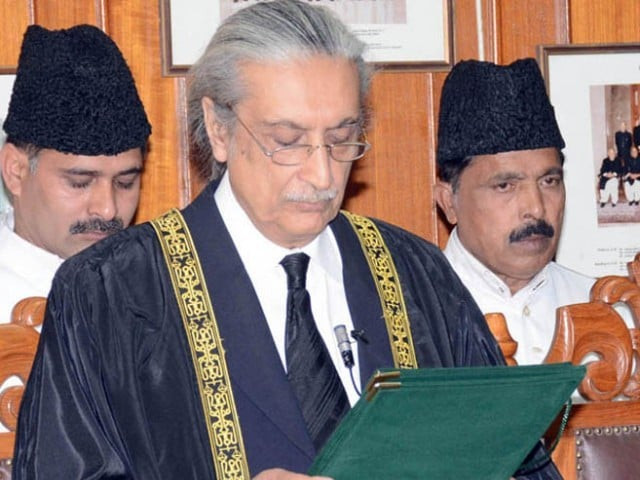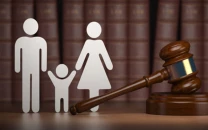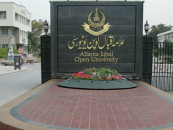Former CJ also challenges military courts
Jawwad S Khawaja asks SC if it could endorse ‘militarisation of justice’

Former chief justice of Pakistan (CJP) Jawwad S Khawaja has also challenged the coalition government’s decision to hold trials of May 9 rioters in military courts, asking if civilian institutions including the Supreme Court can endorse “militarisation of justice”.
"This case is also about power flowing from the barrel of a gun. It is about the power of the army. The army controls businesses and land. Historically, it has exercised power and influence over our political dispensation. Its power and reach extend far beyond its constitutional role. If not a state within a state, it is regarded as an entity distinct from the government and referred to as the ‘establishment’.
“The question for our civilian institutions including this court is whether the militarization of justice will be endorsed,” said a 39-page constitution petition filed through Khwaja Ahmad Hosain advocate.
The former top judge asked if Pakistanis as a nation want to march backwards in time "with banners flying and drums beating to old tunes".
“Or do we see a better tomorrow with public officeholders and institutions operating within constitutionally assigned domains? It is a fundamental question that continues to plague us as a nation. The answer will shape the future," he added.
He said trials of civilians in military courts do not meet international fair trial standards: the right to a public hearing is not guaranteed, there is no right to a reasoned judgment, there are no details about where trials are conducted, and even the details of the charges are kept secret.
“The decision to try civilians by military courts when the civilian courts are functioning is incompatible with the Constitution and a violation of fundamental rights guaranteed therein.”
The petitioner noted that all four types of court martial—general court martial, district court martial, summary court martial, and field general court martial—are not impartial or independent tribunals.
“The ‘judges’ are all serving officers of the military. They do not have any legal training, security of tenure, or other prerequisites which underpin judicial independence.
“All those involved in the proceedings of the court martial are part of and dependent on the executive branch from appointment until retirement,” he added.
The petitioner said trials in military courts lack transparency. The hearings are held in private and behind closed doors. Section 93 of the Pakistan Army Act 1952 states, “persons subject to this Act who commits any offence against it may be tried and punished for such offence in any place whatsoever.”
“There is little to no information on how and where these trials are held. An open and transparent process prior to a finding of guilt is a feature of Islamic jurisprudence. Members of the public need to be given access to hearings and the proceedings must be public.
“This helps ensure that the people are informed, and justice is seen to be done.”
He said in military courts, there is also no right to a reasoned judgment. “According to the International Commission of Jurists, the military courts have a 99.2% conviction rate. This is disproportionately higher compared to the civilian courts.”
The petitioner requested the apex court to declare court martial of civilians and Article 2(1)(d)(i) and (ii) of the Pakistan Army Act 1952 unconstitutional.
Alleged supporters and workers of the Pakistan Tehreek-e-Insaf (PTI) party on May 9 vandalized and set fire to state and army properties and memorials after authorities arrested PTI chief Imran Khan from the premises of a court in the federal capital.
A week after the incident, the country’s military leadership called for holding trials of the rioters in military courts under the Pakistan Army Act, 1952 and the Official Secret Act, 1923. The country’s civilian government endorsed the decision on May 16.
Later dozens of alleged rioters were handed over to military authorities for their court martial. Meanwhile a number of petitioners including the PTI chief Imran Khan, Pakistan Peoples Party (PPP) leader Aitzaz Ahsan and some members of civil society challenged the move.
The apex court has, however, not yet taken up any of the petitions.



















COMMENTS
Comments are moderated and generally will be posted if they are on-topic and not abusive.
For more information, please see our Comments FAQ